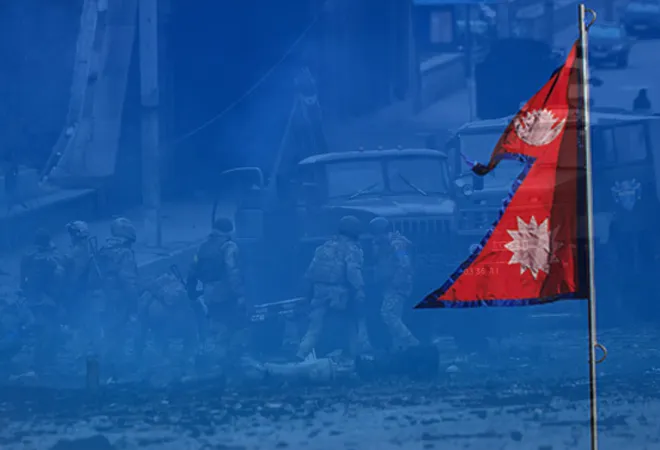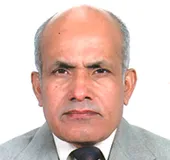-
CENTRES
Progammes & Centres
Location
Is Nepal abandoning its non-aligned policy and siding with the Western bloc as it denounces the Russian invasion?

Ever since Russia invaded Ukraine on 24 February, the war between the two countries has shown no signs of simmering down. The situation is getting worse with every passing day. Russia justified its invasion of Ukraine on the grounds that the latter’s move to join the NATO alliance endangered Russia’s security, as Moscow would be merely 600 kilometers from Ukraine. However, many countries of the world are not convinced with Russia’s logic, and have outrightly criticised the Russian invasion of Ukraine.
In South Asia, India adopted a neutral position in the war between Ukraine and Russia because of its security interest. However, Nepal strongly denounced the Russian invasion of Ukraine whilst voting in the United Nations General Assembly. Nepal demanded Russia to “immediately, completely, and unconditionally withdraw all of its military forces from the territory of Ukraine.”
However, not all Nepalese people have welcomed the stance of the Nepal government on the Russia-Ukraine war. Political leaders, especially from the left block, happen to be more critical of the government on this issue. It is doubted that if Nepal, which was an advocate of a non-aligned policy has deviated from its stand and chosen to fall into the geopolitical traps of the USA.
Defending Nepal’s stand on the Russia-Ukraine crisis, Nepal’s Foreign Minister Narayan Khadka in his first interview with the media stated that Nepal has not taken a side between Russia and Ukraine, though it is opposing the invasion of Ukraine. He also added that Nepal always stood for human rights, peaceful co-existence of small nations, and the UN Charter, therefore Nepal’s voting in the United Nations General Assembly (UNGA) against Russia should not be treated as deviation from the non-aligned policy that it has adhered to for decades.
Defending Nepal’s stand on the Russia-Ukraine crisis, Nepal’s Foreign Minister Narayan Khadka in his first interview with the media stated that Nepal has not taken a side between Russia and Ukraine, though it is opposing the invasion of Ukraine.
By voting against the Russian invasion of Ukraine in the United Nations, Nepal has exhibited that its stand on the war between the two counties is different from that of India and China, which remained neutral on this issue. It is largely believed that Nepal on this issue has toed to the line of the West that directly or indirectly backs Ukraine in the war with Russia.
In Russia’s Ukraine war, Nepal has reasons to follow the US-European Union’s position. Over two-thirds of Nepal’s development budget depends on foreign aid that mainly comes from the western countries and the multilateral institutions like the World Bank, the International Monetary Fund, and the Asian Development Bank (ADB) in which the USA has a greater control.
What matters most for Nepal, at this juncture, is the safety of its citizens who are stranded in Ukraine. Yet, no information is available about the number of Nepalese present in Ukraine. But reports are that most of the Nepalese have already fled Ukraine and have taken shelter in different European countries. Until 12 March, of the 580 Nepalese nationals who fled Ukraine, 466 reached Poland, 87 reached Slovakia, 28 made it to Romania, and eight reached Hungary.
Unlike India which rescued almost all of its citizens from Ukraine under its “Operation Ganga” mission, Nepal has done little to evacuate its people. Credit also goes to India to help evacuate six of the Nepalese nationals from Ukraine who have now safely reached Nepal. Before this, India also earned a reputation for rescuing Nepalese following the event in Afghanistan, when it fell into the hands of the Taliban.
Roshan Jha, a Nepali student who had gone to Ukraine for further studies, described the horrible situation that ensued after the Russian invasion of Ukraine. He is one of those six people who was evacuated from Ukraine and brought to Delhi by the Indian government. Upon his return to India, he said “I am extremely thankful to the Indian government for evacuating me while my country did little to support its people.”
Until 11 March, 564 civilians, apart from 1,300 soldiers, were killed in Ukraine; while in Russia 400 soldiers were killed. The US estimates the number of causalities in Russia is between 2,000 to 4,000. Over 1.5 million Ukrainians have fled their land to neighbouring countries to save their life. If the war between the two countries does not stop, 5 to 10 million people would be forced to flee Ukraine and live as refugees in European countries.
Anxiety looms large over the possibility of a Third World War breaking out if the present war between Russia and Ukraine does not cease. In case the Third World War does occur, it would be difficult for most of the countries to remain neutral. They would have to take sides in the war: Either America-NATO-backed Ukraine or Russia.
Given the asymmetrical military power between Ukraine and Russia, it would be difficult for the Ukrainian government to face the Russian forces.
It is hard to predict what will happen next in Ukraine. Ukraine's pro-West government wants to join the EU and NATO. However, Russia wants to install a pro-Russian regime in Kyiv. Given the asymmetrical military power between Ukraine and Russia, it would be difficult for the Ukrainian government to face the Russian forces. But chances are high that the Ukrainian people and armed forces would continue to give tough resistance to the Russian forces in the time to come.
If the war prolongs longer, it could drain Moscow’s coffers, forcing its withdrawal from Ukraine in the same way as had happened in 1979, after the Russian invasion of Afghanistan where 15,000 Russian soldiers were killed. Even if Russia wins the war with Ukraine, it would be a “pyrrhic victory”—a victory that comes at a great cost to the country.
Nowhere in the world has war won peace. Sooner or later, Russia and Ukraine would have to come back to the negotiating table and settle their disputes diplomatically. However, mediation between the two countries is necessary not only to end the war but also to stop further loss of life of the civilians and soldiers. Need for the mediation is also felt to reduce the suffering of the Ukrainians or citizens of other countries like that of Nepal living in Ukraine who are either fleeing the country or are living in a nightmare. However, that mediation cannot come from the country or countries that have already taken the side of either Russia or Ukraine. In the given situation, the country that has adopted a neutral position on the Russian-Ukraine crisis can play a larger role as a mediator between the two warring nations. It is also the pious duty of the global community, including the politicians, intellectuals, academicians, journalists, and particularly the women, to use their might in stopping the war between Russia and Ukraine. Failing to do so might not only prove catastrophic to merely Russia and Ukraine, but to the entire humanity. Since we are on the same boat, we will sail or sink together.
The views expressed above belong to the author(s). ORF research and analyses now available on Telegram! Click here to access our curated content — blogs, longforms and interviews.

Hari Bansh Jha was a Visiting Fellow at ORF. Formerly a professor of economics at Nepal's Tribhuvan University, Hari Bansh’s areas of interest include, Nepal-China-India strategic ...
Read More +